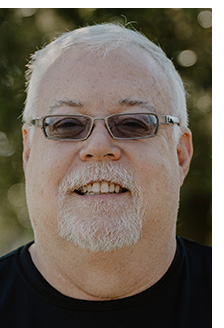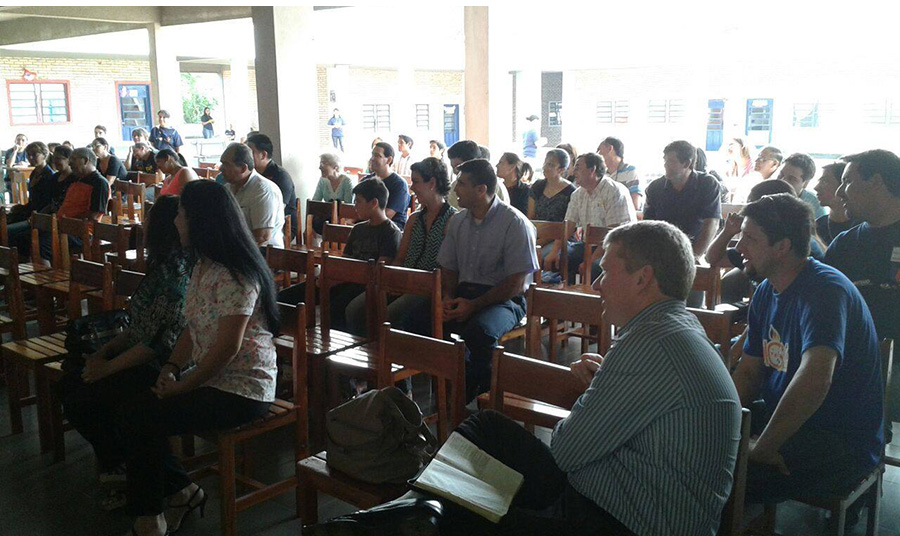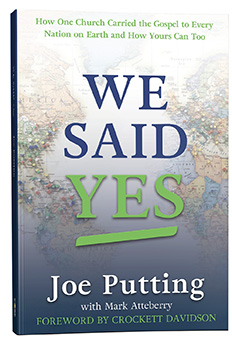By Mark Atteberry
Almost every church has a missions program, but many of them are less than dynamic. They often amount to some sort of annual missions emphasis weekend with a missionary speaker, a touching video or two, perhaps a banquet, and of course, a special offering. Beyond that, the church treasurer doles out a handful of monthly checks that are sometimes so paltry they wouldn’t make the average family’s car payment. I’ve actually known of churches that spent more on their electric bill than they gave to missions.

Back in 1996, Joe Putting, minister of Tomoka Christian Church in Ormond Beach, Fla., was troubled by this all-too-common reality across our fellowship of churches, and even more by his own church’s tepid commitment to missions. He wrestled with the problem, prayed about it, and was ultimately grabbed by a thought that wouldn’t let go: Most churches, his own included, have never really said an emphatic yes to the Great Commission.
Jesus said, “Go and make disciples of all the nations, baptizing them in the name of the Father and the Son and the Holy Spirit” (Matthew 28:19, New Living Translation). Joe became convinced that planning a missions weekend, bringing in a missionary speaker, and mailing out monthly checks that wouldn’t buy a meal at a nice steakhouse could hardly be called an emphatic yes.
So, he and his elders asked a simple question: What would saying an emphatic yes to the Great Commission look like? Then they reread Matthew 28:18-20 with more curious and discerning eyes. When they did, one phrase seemed to jump up and wave its arms, begging to be noticed: “. . . all the nations . . .”
The phrase had always been there, but Joe and his leadership team, like countless Christians, had always thought of it more as a general guideline for the church at large than a challenge to individual congregations. It was when they reversed that mindset and started taking the phrase personally that everything changed. Joe and his elders came out of that season of prayer and reflection with an almost obsessive desire, not just to send monthly support checks to a handful of missionaries in some of the nations of the world, but to find a way to profoundly impact all the nations of the world with the gospel of Jesus Christ.
A MAJOR COMMITMENT TO CHURCH PLANTING
The year was 1996. They looked each other in the eye and committed themselves to planting a church in every nation on earth and every state in the United States. Yes, they knew that meant planting at least 244 churches, some in countries where Christianity is illegal and Christians are imprisoned or killed. They understood that they were committing to plant churches in countries where they didn’t know a soul. And they were well aware they didn’t have the money for such an undertaking. As goals go, it was a doozy, especially for a church running under 200 in weekly attendance and barely breaking even financially. Still, they were convinced that, for them in that moment, saying an emphatic yes to the Great Commission could mean nothing less.
As you might expect, many people were skeptical. Even some of Joe’s preacher friends good-naturedly poked fun: “So how far along are you, Joe? Think you can get the job done before your 200th birthday?”
Recently, I contacted Connie Davis, Tomoka Christian’s director of missions, and asked how many churches they have planted at this point, almost 30 years after the original decision to plant a church in every country and state was made. She explained that the last time she attempted to come up with a count was in 2020, and the number topped 40,000. She said she knew there were many more, but because of where some of the work was being done and the lack of technology, it was almost impossible to get current information. She closed her email with this statement: “When I get to heaven, I’ll ask the Lord how many we got to plant. He’s the only one who knows the actual number!”
I doubt that you would be surprised to learn that Tomoka Christian is no longer a church of under 200. In addition to planting over 40,000 churches, their worship attendance is over 4,000 every weekend. They give $4 million a year to missions. They send between 40 and 50 mission teams out each year. They run 5 crisis pregnancy centers and 24 food pantries. And they run a local medical clinic that gives over $1 million worth of free healthcare to the poor every year.

SOME PIECES OF ADVICE
In his book, We Said Yes!, Joe scoffs at the idea that he is some kind of genius, or that Tomoka Christian was different from any other church back in 1996. He contends that any church can do what Tomoka did (or something similar), and offers the following pieces of advice.
First, whatever you decide to do for missions, do it for the right reason.
If you want God’s blessing on your vision, it can’t be about you. It can’t be because you’re trying to get ahead of (or catch up with) the church across town. It can’t be because you have a new mission-minded member with deep pockets and you don’t want him to get away. It must be about saving souls and making disciples. This is the commission Jesus gave and the commitment he will bless.
Second, get all of your key leaders on board.
If everyone is fully supportive, then you can move forward and sort out the other, smaller questions as you go. If, on the other hand, you have people on your team who are not completely sold on what you’re doing, the same old objections and concerns will keep coming up. You’ll think you’ve answered them and laid them to rest, and then suddenly there they are again. “We’ve been over this before” is a common and tiresome refrain when some on your team have nagging reservations. Few things take the wind out of your sails faster than a lack of unity.
Third, don’t be afraid to be a little crazy.
People thought Noah was crazy when he built a boat on dry ground. They thought David was crazy when he ditched the armor and took a sling and some stones to the battlefield. They thought Peter was crazy when he stepped out of the boat. If there’s one thing the Scriptures teach us, it’s that God is perfectly fine with his people showing big faith that looks a little crazy. It excites him and makes him want to get involved. Remember, if you only do what’s safe and makes sense, you’re basically telling God you don’t need him.
Fourth, make sure the right person is handling the purse strings.
Saying an emphatic yes to missions is harder on the church treasurer than anyone else. Often, Tomoka Christian makes commitments to mission projects without having a clue where the money is going to come from. It’s called faith and God honors it, but it can mean high-level stress and sleepless nights for the person keeping the books. Make sure your treasurer has enough faith to match the vision.
Finally, prepare for chaos.

Big endeavors are always messy. I’ve walked through Tomoka Christian’s office suite and seen boxes of nonperishable foods stacked to the ceiling. I’ve walked through their hallways at Christmastime and seen thousands of Samaritan’s Purse shoeboxes stacked along the walls. Honestly, there’s “missions stuff” piled up everywhere all the time. Sometimes they have so many projects going at once that it seems like you’re caught up in a whirlwind. I don’t believe a messy church building necessarily means a church has great faith. Sometimes the problem is a lousy custodian. But I’ve concluded that the bigger a church’s faith is and the more it’s doing for Christ, the more chaotic and messy things will be. Embrace it.
There are many ways to say yes. A smile, a thumbs up, or a wink and a nod will suffice in many situations. But not when it comes to missions. A lost and decaying world needs more from the church. It needs an emphatic yes.
_ _ _
Read more about Joe Putting and Tomoka Christian Church by ordering a copy of his book, We Said Yes, via his website. Putting will speak at the Spring Ministry Seminar at Point University on April 18. Learn more at point.edu.
Mark Atteberry, who wrote this article, assisted Joe Putting in writing We Said Yes. Atteberry served in Christian ministry for 46 years, concluding with 31 years as senior minister with Poinciana Christian Church in Kissimmee, Fla. He retired in 2020. Atteberry has written or collaborated on more than 20 books. Learn more at markatteberry.net.

Just for some clarification. 40,000 seems like a really big number, meaning bigger than the entire Restoration Movement in the U.S. for over 200 years. That seems like we should have heard of this sooner.
I have worked with multiple Christian churches in the Atlanta area. . . . Around 20 years ago while on vacation, I went to a Sunday night service at Tomoka — I was hooked, even living 450 miles away! What this church does for missions and church work is just spectacular!